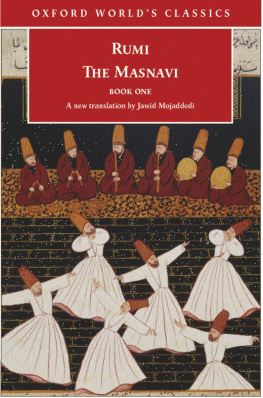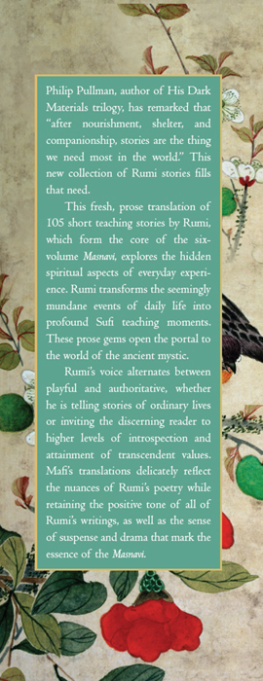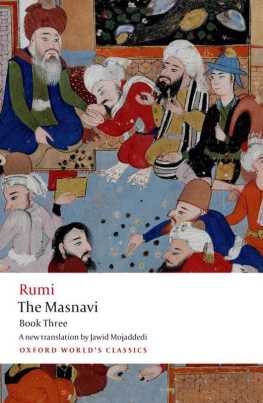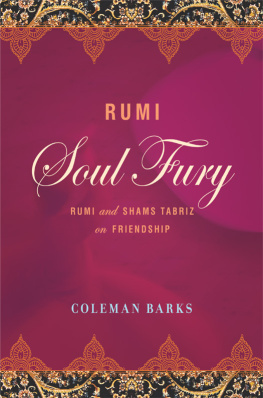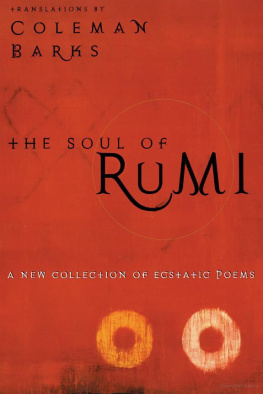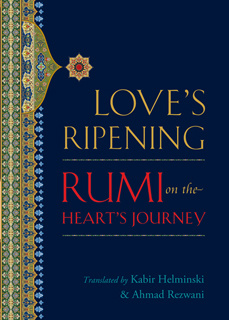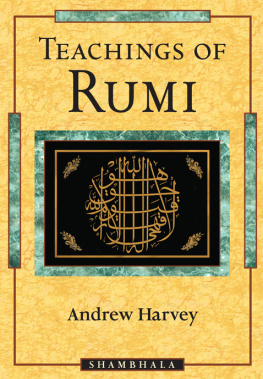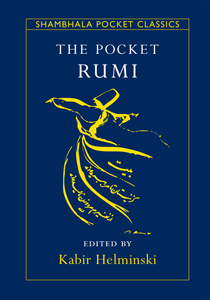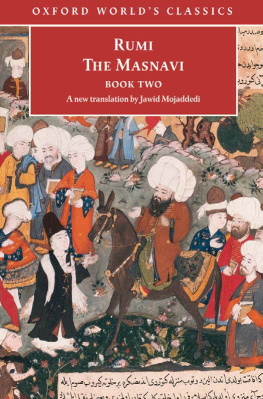Rumi - The Masnavi, Book One: Bk. 1
Here you can read online Rumi - The Masnavi, Book One: Bk. 1 full text of the book (entire story) in english for free. Download pdf and epub, get meaning, cover and reviews about this ebook. publisher: Oxford University Press, genre: Art. Description of the work, (preface) as well as reviews are available. Best literature library LitArk.com created for fans of good reading and offers a wide selection of genres:
Romance novel
Science fiction
Adventure
Detective
Science
History
Home and family
Prose
Art
Politics
Computer
Non-fiction
Religion
Business
Children
Humor
Choose a favorite category and find really read worthwhile books. Enjoy immersion in the world of imagination, feel the emotions of the characters or learn something new for yourself, make an fascinating discovery.
- Book:The Masnavi, Book One: Bk. 1
- Author:
- Publisher:Oxford University Press
- Genre:
- Rating:3 / 5
- Favourites:Add to favourites
- Your mark:
- 60
- 1
- 2
- 3
- 4
- 5
The Masnavi, Book One: Bk. 1: summary, description and annotation
We offer to read an annotation, description, summary or preface (depends on what the author of the book "The Masnavi, Book One: Bk. 1" wrote himself). If you haven't found the necessary information about the book — write in the comments, we will try to find it.
Rumi: author's other books
Who wrote The Masnavi, Book One: Bk. 1? Find out the surname, the name of the author of the book and a list of all author's works by series.
The Masnavi, Book One: Bk. 1 — read online for free the complete book (whole text) full work
Below is the text of the book, divided by pages. System saving the place of the last page read, allows you to conveniently read the book "The Masnavi, Book One: Bk. 1" online for free, without having to search again every time where you left off. Put a bookmark, and you can go to the page where you finished reading at any time.
Font size:
Interval:
Bookmark:

Great Clarendon Street, Oxford OX2 6DP
Oxford University Press is a department of the University of Oxford.
It furthers the Universitys objective of excellence in research, scholarship,
and education by publishing worldwide in
Oxford New York
Auckland Bangkok Buenos Aires Cape Town Chennai
Dar es Salaam Delhi Hong Kong Istanbul Karachi Kolkata
Kuala Lumpur Madrid Melbourne Mexico City Mumbai Nairobi
So Paulo Shanghai Taipei Tokyo Toronto
Oxford is a registered trade mark of Oxford University
Press in the UK and in certain other countries
Published in the United States
by Oxford University Press Inc., New York
Editorial material Jawid Mojaddedi 2004
The moral rights of the author have been asserted
Database right Oxford University Press (maker)
First published as an Oxford Worlds Classics paperback 2004
All rights reserved. No part of this publication may be reproduced, stored in a retrieval system, or transmitted, in any form or by any means, without the prior permission in writing of Oxford University Press, or as expressly permitted by law, or under terms agreed with the appropriate reprographics rights organizations. Enquiries concerning reproduction outside the scope of the above should be sent to the Rights Department, Oxford University Press, at the address above
You must not circulate this book in any other binding or cover
and you must impose this same condition on any acquirer
British Library Cataloguing in Publication Data
Data available
ISBN 0192804383
1 3 5 7 9 10 8 6 4 2
Typeset in Ehrhardt
by RefineCatch Limited, Bungay, Suffolk
Printed in Great Britain by
Clays Ltd, St Ives plc
OXFORD WORLDS CLASSICS
For over 100 years Oxford Worlds Classics have brought readers closer to the worlds great literature. Now with over 700 titles from the 4,000-year-old myths of Mesopotamia to the twentieth centurys greatest novels the series makes available lesser-known as well as celebrated writing.
The pocket-sized hardbacks of the early years contained introductions by Virginia Woolf, T. S. Eliot, Graham Greene, and other literary figures which enriched the experience of reading. Today the series is recognized for its fine scholarship and reliability in texts that span world literature, drama and poetry, religion, philosophy, and politics. Each edition includes perceptive commentary and essential background information to meet the changing needs of readers.
Refer to the to navigate through the material in this Oxford Worlds Classics ebook. Use the asterisks (*) throughout the text to access the hyperlinked Explanatory Notes.
OXFORD WORLDS CLASSICS

JALAL AL-DIN RUMI
BOOK ONE

Translated with an Introduction and Notes by
JAWID MOJADDEDI

OXFORD WORLDS CLASSICS
THE MASNAVI
RUMI, known in Iran and Central Asia as Mowlana Jalaloddin Balkhi, was born in 1207 in the province of Balkh, now the border region between Afghanistan and Tajikistan. His family emigrated when he was still a child, shortly before Genghis Khan and his Mongol army arrived in Balkh. They settled permanently in Konya, central Anatolia, which was formerly part of the Eastern Roman Empire (Rum). Rumi was probably introduced to Sufism originally through his father, Baha Valad, a popular preacher who also taught Sufi piety to a group of disciples. However, the turning-point in Rumis life came in 1244, when he met in Konya a mysterious wandering Sufi called Shamsoddin of Tabriz. Shams, as he is most often referred to by Rumi, taught him the most profound levels of Sufism, transforming him from a pious religious scholar to an ecstatic mystic. Rumi expressed his new vision of reality in volumes of mystical poetry. His enormous collection of lyrical poetry is considered one of the best that has ever been produced, while his poem in rhyming couplets, the Masnavi, is so revered as the most consummate expression of Sufi mysticism that it is commonly referred to as the Koran in Persian.
When Rumi died, on 17 December 1273, shortly after completing his work on the Masnavi, his passing was deeply mourned by the citizens of Konya, including the Christian and Jewish communities. His disciples formed the Mevlevi Sufi order, which was named after Rumi, whom they referred to as Our Lord (Turkish Mevlana/Persian Mowlana). They are better known in Europe and North America as the Whirling Dervishes, because of the distinctive dance that they now perform as one of their central rituals. Rumis death is commemorated annually in Konya, attracting pilgrims from all corners of the globe and every religion. The popularity of his poetry has risen so much in the last couple of decades that the Christian Science Monitor identified him as the most published poet in America in 1997.
JAWID MOJADDEDI, a native of Afghanistan, read Middle Eastern Studies at the University of Manchester. He has taught Arabic and Islamic Studies at the University of Manchester and the University of Exeter, and has served as an editor of Encyclopaedia Iranica at the Center for Iranian Studies, Columbia University. He is currently Assistant Professor of Religion at Rutgers University. Dr Mojaddedis books include The Biographical Tradition in Sufism (Richmond, 2001) and, as co-editor, Classical Islam: A Sourcebook of Religious Literature (London, 2003).
THE MASNAVI
BOOK ONE
This translation is dedicated to the memory of
MR NIKTAB
(d. 12 May 2003)
and
JERRY CLINTON
(d. 7 November 2003)
I SHOULD like to express my gratitude to all those who have helped to make it possible for me to produce this translation of Rumis Masnavi. The teachings of Dr Javad Nurbakhsh have given me the essential background knowledge to understand and appreciate the message of this Persian Sufi masterpiece. Edmund Herzig, Paul Luft, and Colin Turner taught me Persian language and literature at the University of Manchester. The late Norman Calder taught me to appreciate traditional verse forms and convinced me that the Masnavi should be translated into iambic pentameters. With remarkable sensitivity and patience, the late Jerry Clinton taught me how to translate into verse. I received invaluable encouragement from J. Christoph Brgel, Dick Davis, Simin Nabavi, Alireza Nurbakhsh, and Michael Sivori. Julie Scott Meisami offered many insightful criticisms and suggestions that have helped to improve this work significantly, as well as to increase my own understanding of the poetry. Andrew Rippin generously took on the lions share of the responsibility for a project in which I collaborated at the same time as producing this translation and working as a full-time editor of Encyclopaedia Iranica. My colleagues at the Center for Iranian Studies of Columbia University helped make that experience rewarding. After I discovered Rumi when I was a teenager, it was my mother who first nurtured my enthusiasm and interest in his poetry and the Sufi tradition which he represents. I would also like to thank my brother Anis, who has been a major source of inspiration over the past year, and Negin for her loving support and companionship.
Next pageFont size:
Interval:
Bookmark:
Similar books «The Masnavi, Book One: Bk. 1»
Look at similar books to The Masnavi, Book One: Bk. 1. We have selected literature similar in name and meaning in the hope of providing readers with more options to find new, interesting, not yet read works.
Discussion, reviews of the book The Masnavi, Book One: Bk. 1 and just readers' own opinions. Leave your comments, write what you think about the work, its meaning or the main characters. Specify what exactly you liked and what you didn't like, and why you think so.

